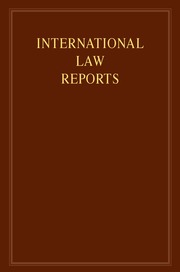Article contents
Maastricht Treaty 1992 Constitutionality Case
Published online by Cambridge University Press: 01 January 2021
Abstract
Relationship of international law and municipal law — Conduct of foreign relations — Treaty-making power — Federal Republic of Germany — Constitutional review of exercise of treaty-making power — Treaty on European Union, 1992 (“Maastricht Treaty”) — Compatibility with Basic Law of the Federal Republic of Germany
Treaties — Conclusion and operation — Constitutional limitations — Accession of Federal Republic of Germany to Treaty on European Union — Extension of powers of European Community — Compatibility with Basic Law of the Federal Republic following enactment of Law amending Basic Law of 28 December 1992 — Article 23(1) of Basic Law — Whether providing satisfactory constitutional basis for accession of Federal Republic to Maastricht Treaty — Whether Federal Constitutional Court should obtain opinion of experts or Community institutions concerning interpretation of Treaty — Whether fundamental principle of democratic legitimacy in Federal Republic undermined by membership of European Union — Whether such membership violating Articles 20, 38 and 79(3) of Basic Law — Whether such membership irreversible — Scope of permissible transfer of sovereignty to Community institutions — Requirement that living democracy must be preserved in Member States during process of European integration — Condition that national parliaments should retain substantial level of authority — Whether acts of Community institutions are subject to national constitutional review to ensure that their powers are not exceeded
International organizations — European Community — Powers — Extension of powers by treaty — Treaty on European Union, 1992 — Legal basis for extension of powers — Whether European Community developing into political union without clearly restricted powers — Distinction between pooling of sovereignty in economic sphere and inter-governmental co-operation in other spheres — Article A of Treaty — Principle of limited specific attribution of powers to Community institutions — Article F(3) of Treaty — Whether granting Union competence to determine or extend its own powers — Effect of principle of subsidiarity — Establishment of common monetary and exchange rate policy — Whether automatically leading towards monetary union beyond control of Member States — Legal effect of target dates for achievement of monetary union — Requirement that extension of Community powers to be accompanied by enhancement of democratic foundations of Community institutions — Requirement that Union should respect national identities and existing democratic principles of Member States — Preamble and Article F(1) of Treaty
Human rights — Procedure for enforcement — Fundamental rights under Basic Law of Federal Republic of Germany — Treaty on European Union, 1992 and secondary legislation — Possible conflict with fundamental rights under Basic Law — Primary role of Court of Justice of European Community in ensuring respect for fundamental rights — Whether Federal Constitutional Court retaining ultimate right to secure compatibility of Community legislation with fundamental constitutional rights
International organizations — European Community — Institutions — Court of Justice — Power — Treaty on European Union, Article L — Exclusion of jurisdiction of Court over certain provisions of Treaty — Whether affecting general jurisdiction of Court to interpret provisions of Community treaties
International organizations — European Community — Institutions — European Parliament — Position within institutional structure of European Union — Role of ensuring democratic legitimacy for Union — Whether any need for enhancement of powers — Significance of method of election by citizens of Member State — The law of the Federal Republic of Germany
Keywords
- Type
- Case Report
- Information
- Copyright
- © Cambridge University Press 1994
- 2
- Cited by




